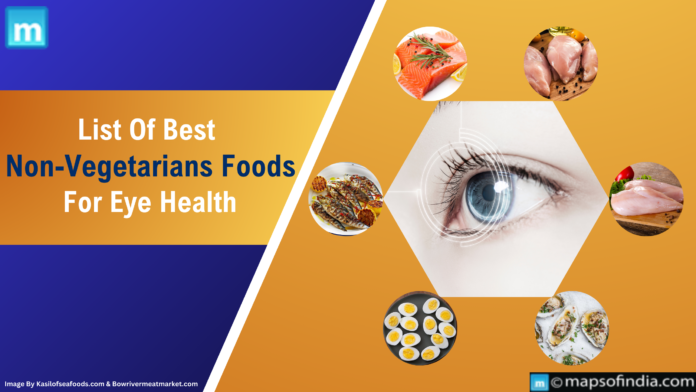Your eyes are vital for your overall health; keeping them healthy requires proper nutrition. Certain nutrients like vitamin A, C, and E, omega-3 fatty acids, lutein, and zeaxanthin are crucial for eye health. These nutrients protect your eyes from damage caused by various factors such as free radicals, inflammation, infection, and ageing. They also lower the risk of eye diseases like age-related macular degeneration (AMD), cataracts, glaucoma, and dry eye syndrome. You can find these eye-friendly nutrients in many fruits, vegetables, beans, nuts, and non-vegetarian foods.
Here Are Best Non-Vegetarian Foods For Your Eyes:
Discover the top non-vegetarian foods that enhance eye health. Learn about their advantages and how to include them in your meals for optimal benefits.
-
Salmon
Salmon is packed with omega-3 fatty acids, which are vital for keeping your eyes healthy. These fatty acids are key in preventing dry eye syndrome, causing discomfort and blurry vision due to insufficient tear production. They also lower the risk of age-related macular degeneration (AMD) and glaucoma, common causes of vision loss in older people.
Additionally, salmon is an excellent source of protein, essential for repairing and growing eye tissues. It also contains vitamin D, which helps regulate eye pressure and guards against glaucoma.
Opt for wild-caught or organic salmon over farmed or processed varieties for maximum benefits. Enjoy salmon in various ways, such as grilled, baked, poached, or smoked, and pair it with leafy greens, whole grains, or citrus fruits for a well-rounded meal.
-
Eggs
Eggs are great for your eyes because they contain two essential antioxidants: lutein and zeaxanthin. These antioxidants are concentrated in your macula, the centre of your retina that helps you see details. Lutein and zeaxanthin shield your macula from harmful blue light emitted by screens, lights, and the sun. They also lower the risk of eye problems like AMD and cataracts and boost contrast sensitivity and night vision.
Eggs are rich in vitamin A, crucial for vision, especially in dim light—vitamin A wards off night blindness, dry eyes, and corneal ulcers. Besides, eggs provide protein, vitamin E, B12, and zinc, which are vital for eye health. Opt for organic, free-range, or omega-3-enriched eggs for maximum benefits. Avoid frying them; try boiling, scrambling, poaching, or making an omelette. Add spinach, tomatoes, or cheese for extra flavour and nutrients.
-
Chicken Breast
Chicken breast is a healthy choice for your eyes because it’s packed with protein, which helps keep your eye tissues strong and working well. This means it can help protect against cataracts, which can cloud your vision.
It’s also rich in vitamin B12, important for making red blood cells that carry oxygen to your eyes. This can help prevent optic neuropathy, which can lead to vision loss. For the best benefits, go for skinless and organic chicken breast, and avoid frying or breading it. Instead, try roasting, grilling, baking, or stir-frying it with herbs, spices, or sauces for extra flavour and nutrients.
For healthy eyes, it’s important to eat right. Include foods like salmon, eggs, and chicken breast in your diet. They’re packed with antioxidants, vitamins, minerals, and protein that keep your eyes in good shape and guard against problems like damage, inflammation, infection, and ageing. But remember, these foods shouldn’t replace a balanced diet with lots of fruits, veggies, beans, and nuts. Always talk to your doctor before changing your diet, especially if you have health issues or allergies.




